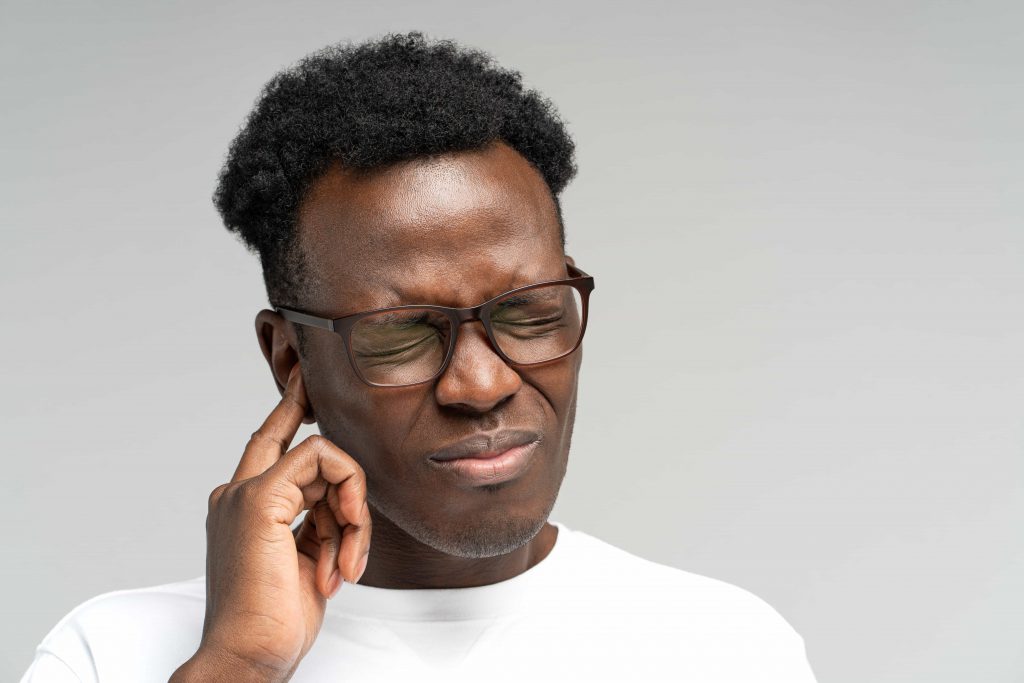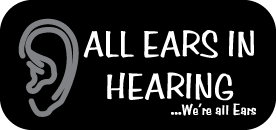Tinnitus
What is Tinnitus?
The word tinnitus derives from a Latin word meaning ‘ringing or tinkling like a bell’. Tinnitus is experienced as noises or ringing in the ears or head and affects people differently, so the description of the sound may vary from person to person. Most people describe the sounds as ringing, buzzing, crickets or humming.
In many cases tinnitus is associated with some degree of hearing loss. Just about anything that causes harm or damage to the cochlea and the hearing nerve may result in the production of false signals which are interpreted by the brain as sounds. Other causes may be stress related, dental or jaw problems or medication side effects.

How common is Tinnitus?

People with tinnitus may experience:
There are several possible causes of tinnitus. The following are among the most common causes of tinnitus.
- Distress
- Depression
- Mood swings and anxiety attacks
- Tension irritability or frustration
- Sleeping problems
- Poor concentration
Causes of tinnitus:
There are several possible causes of tinnitus. The following are among the most common causes of tinnitus.
- Exposure to too loud sounds
- Degeneration of the hair cells (wear & tear) responsible for transmitting sound to the brain
- Physical injury such as a blow or strike to the head or changes in barometric pressure during diving or air travel
- Some prescription and non-prescription drugs
- Stress
- Jaw or dental problems
- Ear disease or infection

What can I do?
Treatment for tinnitus can vary from person to person and can greatly depend upon what has caused the tinnitus. It’s always best to consult your doctor and have a hearing test first. Don’t ever think that there is nothing that can be done to help relieve the tinnitus. Although there is no cure for tinnitus, there are many techniques that one can incorporate into their lives to lessen the effects. Contact All Ears in Hearing for further information on the various tinnitus treatments available.
Hearing Aids
Try to avoid loud sounds
Avoid Silence
Stress
Fatigue
Caffeine
Diet
Alcohol and other drugs
Quit Smoking
Tinnitus Retraining Therapy
What Is Tinnitus Retraining Therapy?
Tinnitus Retraining Therapy, or TRT, is a structured approach designed to help people manage and reduce the impact of tinnitus — the perception of ringing, buzzing, or other sounds in the ears when no external sound is present.
Developed in the 1990s by Dr. Pawel Jastreboff and Dr. Jonathan Hazell, TRT is built on the idea that tinnitus distress isn’t caused just by what we hear, but by how our brain and emotional systems react to it. It focuses on retraining the brain to treat tinnitus as a neutral background sound rather than something threatening or bothersome — a process known as habituation.
Just like people who live near train tracks eventually stop noticing passing trains, TRT helps the brain “tune out” tinnitus over time.
The Two Key Parts of TRT
1. Counseling
The counseling part of TRT helps people understand what tinnitus is — and what it isn’t. Many people feel anxious about tinnitus because they fear it signals something serious. Counseling clears up misconceptions and explains how the auditory system, brain, and emotions all interact.
During these sessions, audiologists explain how tinnitus forms, why it can become distressing, and how the body’s stress response plays a role. The goal is to replace fear or frustration with understanding and confidence.
2. Sound Therapy
The sound therapy component uses gentle background sounds to make tinnitus less noticeable. Rather than trying to cover or “mask” it completely, sound therapy reduces the contrast between tinnitus and silence, helping the brain to gradually ignore it.
This can be done in several ways:
- Small sound generators worn like hearing aids that play soft, neutral sounds
- Environmental sounds, such as fans, fountains, or soft background music
- Combination devices that act as both hearing aids and sound generators
- Sound machines used at night for relaxation or sleep
The idea is to keep a steady, soothing sound around you — enough to help the brain reclassify tinnitus as something unimportant.
The TRT Journey
Assessment and Planning
Your TRT program starts with a detailed hearing and tinnitus evaluation. This includes checking for hearing loss, identifying the pitch and loudness of your tinnitus, and understanding how it affects your daily life. Based on these findings, you’ll be placed into one of several categories that guide your treatment plan — whether you have hearing loss, sound sensitivity, or primarily tinnitus distress.
Implementation
Once the plan is set, you’ll begin a mix of counseling and sound therapy. Early sessions are usually more frequent, such as monthly, before spacing out over time as you adjust and improve.
Duration and Expectations
TRT isn’t a quick fix — it’s a gradual process that typically lasts from 12 to 24 months. Success depends on consistency, patience, and following your audiologist’s guidance. Most people wear their sound devices for 8–10 hours a day as part of their normal routine.
Over time, people usually notice:
- Less awareness of tinnitus
- Reduced emotional response to it
- Better sleep and focus
- Fewer avoidance behaviors (like seeking silence or masking constantly)
The Science Behind TRT
TRT is grounded in neuroscience. It’s based on the neurophysiological model, which explains that tinnitus becomes distressing when it activates the brain’s emotional (limbic) and automatic (autonomic) systems. These areas link tinnitus to stress, anxiety, and alertness.
Through repeated exposure and reconditioning, TRT teaches the brain to break that emotional link — allowing tinnitus to fade into the background. Research shows that this approach can significantly improve quality of life for many people.
Who Can Benefit from TRT
Adults with Chronic Tinnitus
For those who’ve experienced tinnitus for a long time, TRT can help break the habit of constantly focusing on the sound and reduce anxiety over time.
People with Hearing Loss
If hearing loss is also present, combination hearing aids and sound generators are often used. Amplifying external sounds helps reduce tinnitus perception while supporting communication.
People with Sound Sensitivity
For individuals with hyperacusis (sound sensitivity), TRT includes gradual sound desensitization to make everyday sounds more comfortable again.
The Importance of Professional Guidance
TRT should always be guided by a trained audiologist who understands both the auditory system and the emotional side of tinnitus. Regular follow-ups ensure your program stays on track, with adjustments made as your tolerance and comfort improve. The process is collaborative — you and your clinician work together to reach long-term habituation.
Tinnitus Retraining Therapy helps people retrain how their brain responds to tinnitus, shifting it from an intrusive sound to a neutral one. It combines expert counseling with gentle sound therapy over several months to gradually reduce awareness and distress.
While it takes patience and commitment, Rachel has been trained to provide TRT by Dr Pawel Jastreboff, helping people reclaim focus, calm, and quality of life.
DISCLAIMER:
The information on this website is provided for educational purposes only. We do not support, nor recommend any products or treatments without proper hearing diagnostic and proper hearing evaluation. All users must seek professional advice before beginning treatment as well as inform themselves of known side effects/risks associated with said procedure(s).
